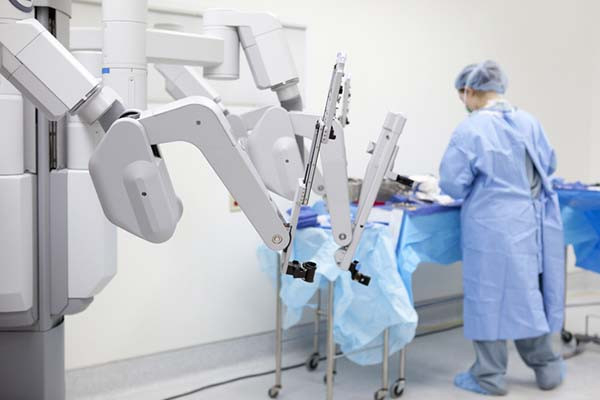
25, Apr 2024
What complications can occur after prostate cancer surgery?

Earlier this year, US defense secretary Lloyd Austin was hospitalized for complications resulting from prostate cancer surgery. Details of his procedure, which was performed on December 22, were not fully disclosed. Press statements from the Pentagon indicated that Austin had undergone a minimally invasive prostatectomy, which is an operation to remove the prostate gland. Minimally invasive procedures are performed using robotic instruments passed through small “keyhole” incisions in the patient’s abdomen.
Just over a week later, Austin developed severe abdominal, hip, and leg pain. He was admitted to the intensive care unit at Walter Reed Hospital on January 2 for monitoring and further treatment. Doctors discovered that Austin had a urinary tract infection and fluid pooling in his abdomen that were impairing bowel functioning. The defense secretary was successfully treated, but then readmitted to the ICU on February 11 for what the Pentagon described as “an emergent bladder issue.” Two days after undergoing what was only described as a “non-surgical procedure performed under general anesthesia,” Austin was back at work. His cancer prognosis is said to be excellent.
Austin’s ordeal was covered extensively in the media. Although we cannot speculate about his specific case, to help our readers better understand the complications that might occur after a prostatectomy, I spoke with Dr. Boris Gershman, a urologist at Harvard-affiliated Beth Israel Deaconess Medical Center in Boston. Dr. Gershman is also a member of the advisory and editorial board for the Harvard Medical School Guide to Prostate Diseases.
How common are urinary tract infections after a prostatectomy?
Minimally invasive prostatectomy is generally well tolerated. In one study that examined complications among over 29,000 men who had the operation, the rate of urinary tract infections was only 2.1%. The risk of sepsis — a more serious condition that occurs if the body’s response to an infection damages other organs — is much lower than that.
How would a urinary tract infection occur?
Although urinary tract infections are rare after prostatectomy, bacteria can travel into the urinary system through a catheter. An important part of a prostatectomy involves connecting the urethra — which is a tube that carries urine out of the body — directly to the bladder after the prostate has been taken out. As a last step in that process, we pass a catheter [a soft silicone tube] through the urethra and into the bladder to promote healing. Infection risks are minimized by giving antibiotics both during surgery and then again just prior to removing the catheter one to two weeks after the operation.
How do you treat urinary infectious complications when they do happen?
It’s not unusual to find small amounts of bacteria in the urine whenever you use a catheter. Normally they don’t cause any symptoms, but if infectious complications do occur, then we’ll admit the patient to the hospital and treat with broad-spectrum antibiotics that treat many different kinds of bacteria at once. We’ll also obtain a urine culture to identify the bacterial species causing the infection. Based on culture results, we can switch to different antibiotics that attack those microbes specifically. The course of treatment generally lasts 10 to 14 days.
Lloyd Austin also had gastrointestinal complications. Why might that have occurred?
Although I cannot speculate about Austin’s specific case, in general gastrointestinal complications are very rare — affecting fewer than 2% of patients treated using robotic methods. However, a few different things can happen. For instance, the small intestine can “fall asleep” after surgery, meaning it temporarily stops moving food and wastes through the bowel.
This is called an ileus. It can be due to multiple reasons, including as a result of anesthetics or pain medications. An ileus generally resolves on its own if patients avoid food or water by mouth for several days. If it causes too much pressure in the bowel, then we “decompress” the stomach by removing accumulated fluids through a nasogastric tube, which is threaded into the stomach through the nose and throat.
Some patients develop a different sort of surgical complication called a small bowel obstruction. We treat these the same way: by withholding food and water by mouth and removing fluids with a nasogastric tube if necessary. If the blockages are caused by scar tissues, in rare cases this may require a second surgery to fix the obstructing scar tissue.
Fluids might also collect in the pelvis after lymph nodes are removed during surgery. What’s happening in these cases?
Pelvic lymph nodes that drain the prostate are commonly removed during prostatectomy to determine if there is any cancer spread to the lymph nodes. A possible risk from lymph node removal is that lymph fluid might leak out after the procedure and pool up in the pelvis. This is called a lymphocele. Most lymphoceles are asymptomatic, but infrequently they may become infected. When that happens, we treat with antibiotics, and we might drain the lymphocele using a percutaneous catheter [which is placed through the skin]. Fortunately, newer surgical techniques are helping to ensure that lymphoceles occur very rarely.
Are there individual factors that increase the risk of prostatectomy complications?
Certainly, patients can have risk factors for infection. Diabetes, for instance, can inhibit the immune system, especially when patients have poor glycemic or glucose control [a limited ability to maintain normal blood sugar levels]. If patients have autoimmune diseases, or if they’re taking immunosuppressive medications, they may also be at increased risk of infectious or wound healing complications with surgery, and in some cases, may instead be treated with radiation to avoid these risks.
Thanks for walking me through this complex topic! Any parting thoughts for our readers?
It’s important to discuss the potential risks of surgery with your doctor so you can be fully informed. That said, prostatectomy these days using the minimally invasive approach has a very favorable risk profile. The majority of patients do really well, and fortunately severe complications requiring hospital readmission are very rare.
About the Author

Charlie Schmidt, Editor, Harvard Medical School Annual Report on Prostate Diseases
Charlie Schmidt is an award-winning freelance science writer based in Portland, Maine. In addition to writing for Harvard Health Publishing, Charlie has written for Science magazine, the Journal of the National Cancer Institute, Environmental Health Perspectives, … See Full Bio View all posts by Charlie Schmidt
About the Reviewer

Marc B. Garnick, MD, Editor in Chief, Harvard Medical School Annual Report on Prostate Diseases; Editorial Advisory Board Member, Harvard Health Publishing
Dr. Marc B. Garnick is an internationally renowned expert in medical oncology and urologic cancer. A clinical professor of medicine at Harvard Medical School, he also maintains an active clinical practice at Beth Israel Deaconess Medical … See Full Bio View all posts by Marc B. Garnick, MD
- 0
- By pnxuez
